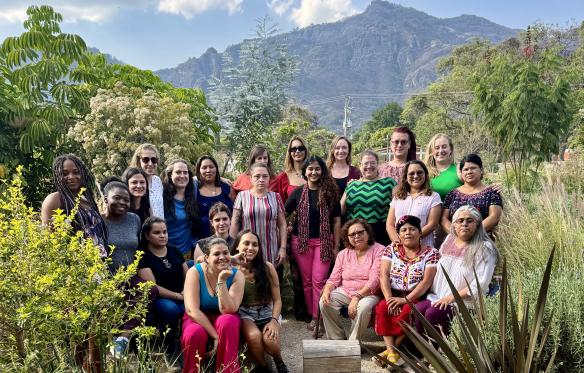Professor Berry’s Life Work: Unveiling Women’s Resilience in Post-War Conflict
By Kat Vess
For the past two decades, a question has driven Professor Marie Berry's research that haunted her even in childhood: "How do people survive, and even thrive, after war?" Professor Berry's years of activism and research on the impact of war on women are especially relevant during current global events. As the student writer at the Korbel School, I recently sat down with her to better understand how her research offers insight into the global armed conflicts we witness today.
Dr. Berry's research challenges the traditional narrative of women as passive victims in war. She highlights women's resilience and activism, even in the face of adversity. Her work underscores the dual reality of war, where trauma and hardships coexist with powerful triumphs of resistance. This nuanced perspective is a refreshing departure from the often bleak portrayal of global conflicts.
Over the past four years, Professor Berry has been working on an expansive, six-country research project titled the "Women's Rights After War Project," which focuses on Columbia, Sri Lanka, Nepal, Rwanda, Bosnia, and Iraq. Berry herself focuses most of her research on Columbia and Nepal, two countries that have recently gone through a civil war and progressed women's empowerment. Part of this, as Berry explains, stems from the fact that rebel fighters in Columbia and Nepal shared a leftist perspective on gender equality, and as a result of power sharing agreements between government actors and rebel leaders, the country integrated some of these perspectives post-war. Berry states that the core questions motivating the research and experimentation taking place in the project are, "Who is able to benefit from these women's empowerment initiatives in the aftermath of armed conflict, what does it take to empower women after war, and what are some of the barriers to women's empowerment?" The project was designed to have a feminist collective approach for the research, so many of the questions being asked were originally created by women in the areas of conflict themselves. Berry adds that part of this project's experimentation lies in the belief that knowledge can be stored and conveyed through different mediums. With this in mind, the project has done extensive work with local artists of the regions — studying and transferring the artwork into a digital archive for study. Through years of research, Berry and her team (including her co-lead on the project, Milli Lake, from the London School of Economics) have found substantial evidence that war can act as a catalyst to thrust activism for gender rights into fruition. Berry concludes by emphasizing the importance of working with grassroots and community-led organizations for women's empowerment, especially in areas of political unrest.
From May 1-3, 2024, Berry will host the Feminist Peace Summit in Denver, which will bring many of these topics and themes to our community. The three-day event will invite leaders in the feminist and anti-war movements to discuss issues in international policy surrounding armed conflict. As Berry explains, this summit aims to "convene students, community members, policymakers, philanthropists, activists, academics and more to try to catalyze a strong anti-war, anti-militarist approach to feminist foreign policy." Dr. Berry is collaborating with colleagues at the organizations Madre, Women Cross DMZ, and Grassroots Global Justice Alliance to host this Summit, which will be unique by virtue of its emphasis on bringing anti-war movements and feminist movements together. Berry says the event is structured to be discussion-heavy with breakout groups so that attendees can engage with their local communities.
My conversation with Professor Berry shows that her work expands far from purely academic— activism is at the core of her endeavors. Her involvement with numerous groups on campus that work towards global women’s leadership is shaping how the Korbel School progresses and heightens its academic standards.



